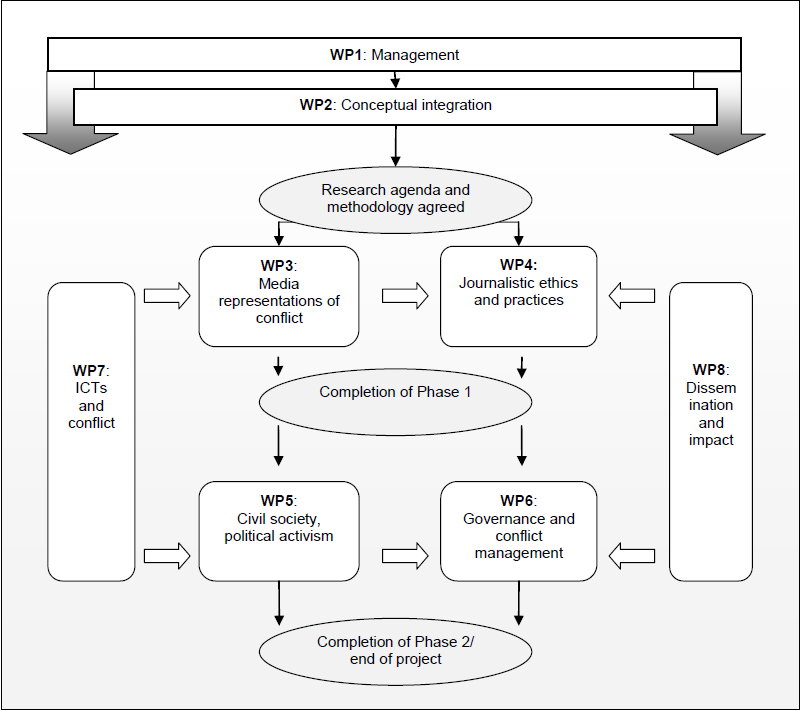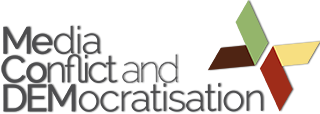Structure

Work package 1: Project management and progress control
- Maintains communication with EU, including regular reporting;
- Provides effective project management structure to ensure timely delivery of outputs at the highest standard;
- Maintains effective internal communication;
- Mediates and resolves conflicts between partners;
- Organises and conducts Consortium Meetings, meetings of the Steering Committee and the Project Management Group;
- Monitors progress throughout the duration of the project.
The leader of this work package is Katrin Voltmer, University of Leeds (UK).
Work package 2: Conceptual and methodological integration
- Provides intellectual leadership;
- Ensures conceptual coherence across WPs;
- Ensures comparability and methodological compatibility across WPs.
The leader of this work package is Katrin Voltmer, University of Leeds (UK).
Work package 3: Media representations of democratisation conflicts
- Analyses how the media report on a selected set of democratisation conflicts;
- Identifies patterns of coverage with regard to conflict frames, images of ‘the other’, identity appeals and instrumentalisation of history, etc.;
- Traces the flow of ideas between online discourses and traditional media coverage;
- Compares conflict coverage of democratisation conflicts across four countries.
The leader of this work package is Nebojša Vladisavljević, University of Belgrade (Serbia).
Work package 4: Journalistic ethics and work practices in conflict societies
- Investigates the ethical orientations, role perceptions and working practices of journalists in democratisation conflicts across four countries;
- Analyses the interplay between online and offline journalism;
- Investigates regulatory and informal constraints on journalists in conflict situations.
The leader of this work package is Irene Neverla, University of Hamburg (Germany).
Work package 5: Civil society, political activism and communications in democratisation conflicts
- Outlines and describes the types of political activism and protest involved in democratisation conflicts;
- Explores the use of traditional media by activist groups to mobilise and organise support and to influence public debate and policy outcomes;
- Investigates the use, influence and impact of ICTs in facilitating political activism and protest in democratisation conflicts;
- Compares the impact of mediated activism on the dynamic of democratisation conflicts in four emerging democracies.
The leader of this work package is Herman Wasserman, University of Cape Town (South Africa).
Work package 6: Governance, communication capacity and conflict management
- Describes and analyses how governments communicate during periods of conflict and how this impacts on the escalation or resolution of the contestation;
- Investigates the policies employed by governments to manage media coverage during democratisation conflicts;
- Investigates how governments address the challenge posed by ICTs;
- Compares government communication strategies and their effectiveness in managing conflicts in four emerging democracies.
The leader of this work package is Nicole Stremlau, University of Oxford (UK).
Work package 7: ICTs and democratisation conflicts
- Investigates the contribution of ICTs to the dynamics of democratisation conflicts;
- Assists work packages in employing ICTs and research tools;
- Develops recommendations for the use of ICTs in conflict prevention, management and resolution.
The leader of this work package is Christian Christensen, Stockholm University (Sweden).
Work package 8: Dissemination and impact
- Disseminates information about project activities and research results to both academic and non-academic end-users;
- Engages with a wide range of stakeholders, encouraging them to take part in and advise on project activities;
- Provides main stakeholders, such as practitioners, policymakers and NGOs, with tailored information on relevant project results to enhance impact;
- Provides media with tailored information on relevant project results to increase dissemination to the general public;
- Investigates and evaluates the effectiveness of media assistance programmes in conflict societies.
The leader of this work package is Barbara Thomass, Ruhr University Bochum (Germany).
